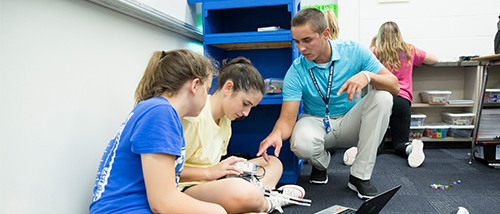Elementary Education/Middle School Math
Continue to main content
Elementary Education/Middle School Math Degree Map
Explore the courses you'll need to complete your degree
Outcomes & Careers
-
$68k
Elementary Teacher
According to the Bureau of Labor Statistics, the mean annual salary for an elementary school teacher is $68,000.
-
$67k
Middle School Teacher
According to the Bureau of Labor Statistics, the mean annual salary for a middle school teacher is $67,790.
-
$74k
Special Education Teacher
According to the Bureau of Labor Statistics, the mean annual salary for a special education teacher is $74,310.
As an elementary education/middle school math major, you’ll learn to meet the rigor of teacher education in a supportive environment with faculty who have extensive classroom experience themselves. You’ll complete a minimum of 120 credit hours to complete this degree, including the general education requirements and at least 39 senior division hours.
Elementary Education students must be admitted to the Educator Preparation Program prior to enrolling in upper division (300 level or above) education courses.
A grade of ‘C’ or better is required in education courses. A grade of ‘B’ is required in ED 280.
“Critical Courses” are bolded. Data shows that students who have completed this course in the first two years and have earned the noted grade are most likely to complete this program of study.
Professional Education Requirements
- BS118 Intro Process Science Elem Teachers (1)
- CF233 Creative Thought & Expression in Children (3)
- ED280 Introduction to Education as a Profession (3)
- ED506 Education Law and Society (3)
- EF400 Student Teaching Seminar (1)
- EL274 Diversity in American Schools (3)
- EL300 Instructional & Assistive Technology in a Universally Designed Learning Environment (3)
- EL314 Literacy Field Experience (3)
- EL316 Emergent and Early Literacy Instruction (3)
- EL317 Literacy Methods for Elementary Teachers (3)
- EL340 Classroom Management (3)
- EL350 Content Field Experience (3)
- EL354 Meeting the Needs of Struggling Readers (3)
- EL355 Content & Disciplinary Literacy (3)
- EL360 Integrated Math, Science, Social Sciences, Health Instruction (3)
- EL410 Differentiated Instruction (3)
- EL420 Assessment & Data Analysis (3)
- EL430 Advanced Field Experience (3)
- EL480 Elementary Education Student Teaching (12)
- EN140 Rhetoric & Critical Thinking (3)
- EX390 Psychology of the Exceptional Child (3)
- LI243 Children’s Literature (3)
- MA128 Numbers and Operations for Educators (4)*
- MA228 Geometry & Measurements for Educators (4)
- SE311 Techniques of Teaching Mathematics (3)
- SE360 Pedagogy 2: Interdisciplinary Methods for Middle School (3)
Choose 3 hours:
- CF120 Foundations of Child Development (3)
- PY120 Psychological Development of the Child (3)
- PY222 Development of the Adolescent (3)
Mathematics Content Courses
- MA137 Precalculus (5)
- MA140 Analytic Geometry and Calculus I (5)
- MA223 Elementary Probability Statistics (3)
- MA250 Foundations of Mathematics (3)
- MA438 Nature & Growth of Mathematical Thought (3)
Additional Requirements:
(These courses may also meet General Education requirements)
- BS218 Biological Science: A Process Approach (3)
- EC101 Economic Problems & Policies (3)
- EN100 English Composition I (3)
- PH218 Physical Science: A Process Approach (3)
- PS103 U.S. Political Systems (3)
- SC105 Fundamentals of Oral Communication (3)
- UI308 Physical/Cultural Landscapes of the World (3)
- US105 American History I (3)
NOTE: All Pre-Education courses are pre-requisite to all Education courses.
*Students who score less than 22 on the ACT math subscore must also take MA 018 lab support.
- 42 credit hours completed
- One of the following:
- Composite/Superscore of 20 or higher on the ACT exam
- Composite score of 1040 or higher on the SAT exam
- Passing scores on all sections of the Missouri General Education Assessment (MoGEA)
- A 4-year degree from an accredited college/university
- The following course requirements met:
- A grade of C or above in CF/PY120 The Child (Elementary, Early and Exceptional) or PY222 Development of the Adolescent (5-9, 9-12 and PK12)
- A grade of B or above in ED280 Introduction to Education as a Profession.
Some requirements may be fulfilled by coursework in major program.
- Social and Behavioral Sciences – 6 hours
- Constitution Requirement – 3 hours
- Written Communication – 6 hours
- Oral Communication – 3 hours
- Natural Sciences – 7 hours (from two disciplines, one to include a lab)
- Mathematics – 3 hours
- Humanities & Fine Arts – 9 hours (from at least two disciplines)
- Additional requirements – 5 hours (to include UI100 for native students)
- Civics examination
- 3.0 professional education GPA
- Pass the following Missouri Content Assessments:
- 073-074 Elementary Education Multi-Content (English Language Arts, Social Studies, Science Math)
- 012 (Middle School Mathematics)
- Successfully complete all required course work and field experiences
- Early – explore the role of educators before you commit to the degree.
- Mid-level – elementary education majors adding on middle school math certification do field experiences in both elementary grades and middle school math classrooms.
- Student Teaching – semester long, co-teaching capstone experience in an early childhood classroom (PreK – 3rd grade)
First Year
Fall Semester (15 Hours)
- UI100 (1)
- EN100 (3)
- BS118 (1)
- MA128 (4)
- SC105 (3)
- US105 (3)
Spring Semester (16 Hours)
- BS218 (3)
- ED280 (3)
- EN140 (3)
- MA228 (4)
- PY/CF120 (3) or PY222 (3)
Milestone: Maintain 3.0 GPA in content courses
Second Year
Fall Semester (17 Hours)
- EC101 (3)
- EL274 (3)
- LI243 (3)
- MA137 (5)
- PH218 (3)
Spring Semester (17 Hours)
- CF233 (3)
- MA140 (5)
- MA250 (3)
- PS103 (3)
- UI308 (3)
Milestone: Maintain 3.0 GPA in content courses; Passing score MoGEA or ACT
Third Year
Fall Semester (18 Hours)
Literacy Block
- EL300 (3)
- EL314 (3)
- EL316 (3)
- EL317 (3)
- EL340 (3)
- MA223 (3)
Spring Semester (18 Hours)
Content Block
- EL350 (3)
- El355 (3)
- EL360 (3)
- EX390 (3)
- SE311 or ED506 (3)
- SE360 (3)
Milestone: Maintain 3.0 GPA in content and education courses
Fourth Year
Fall Semester (15 Hours)
Advanced Block
- EL354 (3)
- EL410 (3)
- EL420 (3)
- EL430 (3)
- SE311 or ED506 (3)
Spring Semester (13 Hours)
Student Teaching Block
- EF400 (1)
- EL480 (12)
Milestone: Passing score MOContent Exams and MEES; 3.0 GPA in math content and professional education courses.
What will it cost?
Become a Redhawk.
Do more than dream about the future. Take the first steps to make it all happen.
Get Funding for Your Education
Missouri’s opened the door to a more educated workforce. We want to help you walk through it. If you’re an adult learner and a Missouri resident returning to college, learn about the Fast Track Workforce Incentive Grant. It’s a statewide financial aid program that can be used to pursue a certificate, degree or industry-recognized credential in a high need area in Missouri. This major is eligible for the Fast Track grant.
Accreditations
See the world as you gain experience: You'll do that here.
Do your student teaching abroad in a variety of locations, including our partnership with Eagles College in Iquique, Chile.
Learn to Teach
The Will to Do
Technology in the Classroom
Southeast has started an EDvolution®. It’s our tech-ready promise to prepare majors to use and integrate instructional technology in the classroom, so students can do so seamlessly in their classrooms as beginning teachers. All students in Educator Preparation Programs must have a device, i.e. laptop, or iPad, for use during the program.
- Tech for You: become a better student with technology
- Tech for Us: learn how to teach with technology
- Tech for Them: use technology in your field experiences
Tomorrow’s Teachers Learning Community
As an elementary, early, and special education major, you can choose to participate in Tomorrow’s Teachers Learning Community. This is Special Interest Housing comprised of groups of students with a shared academic interest either on the same floor or within the same residence hall. These communities provide students an opportunity to challenge and shape their personal and professional identities. They build community with programming designed by faculty and staff from their academic area and Residence Life staff. It gives you the opportunity to know, support, and collaborate with others to help in your academic and personal success.
Cape Girardeau, MO 63701








